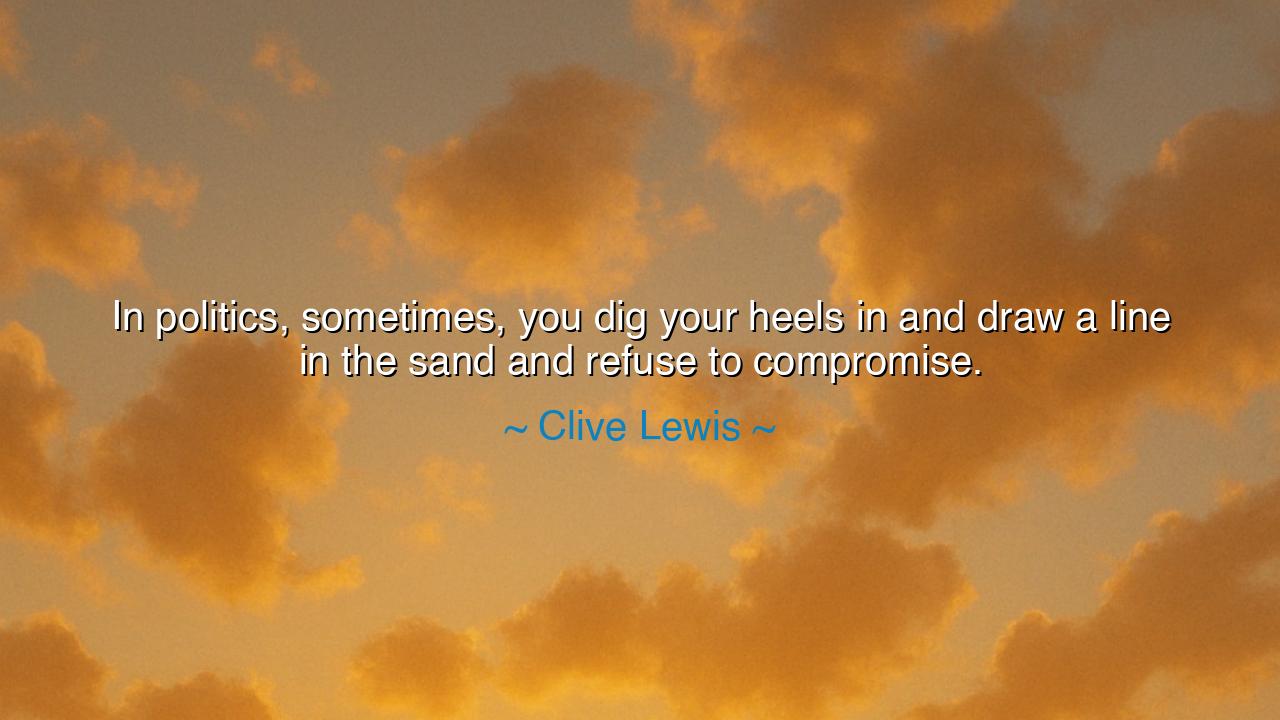
In politics, sometimes, you dig your heels in and draw a line in
In politics, sometimes, you dig your heels in and draw a line in the sand and refuse to compromise.






O children of the future, hear the words of Clive Lewis, who speaks of a sacred and powerful act in the realm of politics: "In politics, sometimes, you dig your heels in and draw a line in the sand and refuse to compromise." In these words lies the heart of a truth as old as time itself—that there are moments when one must stand firm, when the forces of oppression, deceit, or injustice press upon the soul and the only honorable choice is to refuse to yield. There are times when the very essence of one's being and the integrity of the future demand that we resist, even when the winds of compromise howl fiercely against us.
In the ancient world, there were warriors and leaders who knew the power of such defiance. Hannibal, the great Carthaginian general, famously refused to surrender even when all seemed lost. When his army was besieged on all sides, he did not retreat; instead, he made his stand, drawing a line in the sand that defined his legacy as one of unwavering resolve. The very act of standing firm—refusing to compromise—is what marked him as a figure of strength and courage throughout history. He knew that there are moments in the battle for justice when retreat is no option; it is in those moments that the soul finds its true power.
Consider also the ancient tale of Spartacus, the gladiator turned leader of a great revolt against the Roman Empire. When faced with the overwhelming might of Rome, Spartacus drew his line in the sand—not in the hopes of winning a battle, but in the belief that his cause was so just that he would rather die in defiance than live in submission. His refusal to compromise, his decision to lead his men toward freedom, is a testament to the power of conviction in the face of impossible odds. The line he drew was not just a physical one but a spiritual one—a declaration to the world that some things are worth fighting for, no matter the cost.
In politics, O heirs of wisdom, there are also those who have stood at such crossroads, like Nelson Mandela, who, for years, drew a line in the sand against the oppressive regime of apartheid. In the face of injustice, he did not compromise his vision of a free, equal South Africa. Even in the darkness of his prison cell, his resolve remained unbroken. His defiance was not a refusal to engage, but a commitment to moral truth—a truth that could never be surrendered, for it was the foundation of his fight for the oppressed. His strength lay in the fact that he understood that some battles must be fought with unyielding tenacity.
Let us then understand, O children, that there are times in politics and in life when we must dig our heels in and refuse to compromise. This is not an act of stubbornness for stubbornness' sake, but of courage and principle—a stand against forces that seek to destroy our integrity and our freedom. The line in the sand is not just a mark on the ground, but a declaration of the soul’s resolve. In those moments, we are called not to negotiate with the winds of change, but to stand tall and declare that the world will not bend us. For in that refusal, we build the future.






GDGold D.dragon
While I see the merit in Clive Lewis’s call to draw a line in the sand, it also makes me think about the costs. Could being too rigid in politics actually isolate potential supporters who might otherwise agree on some points? In an era of increasing division, can politicians afford to be uncompromising, or is there a greater need for flexibility to create solutions that everyone can rally behind?
NCNgoc Cao
Clive Lewis’s view on uncompromising politics seems powerful, but how do we avoid the negative consequences of rigid stances? Politicians who refuse to bend often end up creating more division than unity. Is there a way to keep your integrity while still working with others who may not share the same beliefs? Can we have the strength to draw a line without compromising the possibility of cooperation?
Ssuc
I appreciate Clive Lewis's point about drawing a line in the sand, but I wonder—how do politicians choose when to stand firm and when to negotiate? Is there ever a situation where compromise is more important than sticking to your position, even if it means losing ground on certain issues? It seems like the ability to flex and adapt in politics might be just as valuable as standing your ground on principles.
CTMinh Chau Tran
Clive Lewis’s statement about refusing to compromise is an interesting take on political strategy, but I’m curious—does this approach always serve the public interest? Sometimes, the best policies come from negotiation and compromise. Can a firm stance be maintained without leaving room for collaboration, or does it ultimately stifle meaningful change? I’d love to hear how others feel about the line between principle and pragmatism in politics.
DTDuoc Tran
I understand the sentiment behind Clive Lewis’s quote, but I wonder if this mentality is sustainable in today’s polarized political climate. Drawing a hard line can feel empowering, but can it really lead to long-term success? If both sides dig in their heels, doesn't it just lead to gridlock? How do we strike a balance between standing our ground and finding common ground for the greater good?